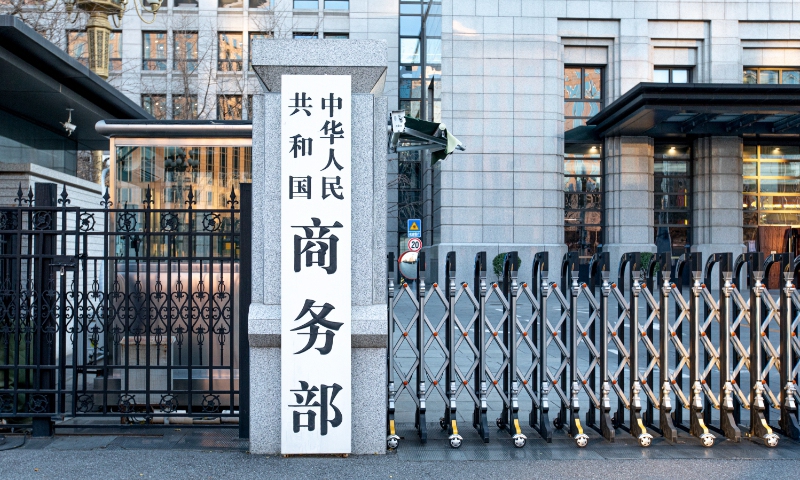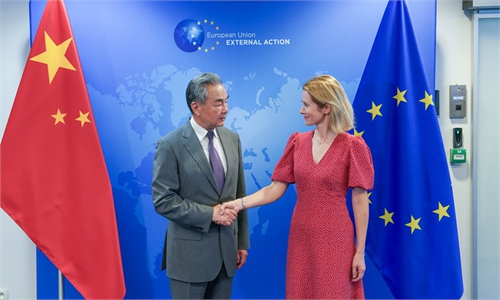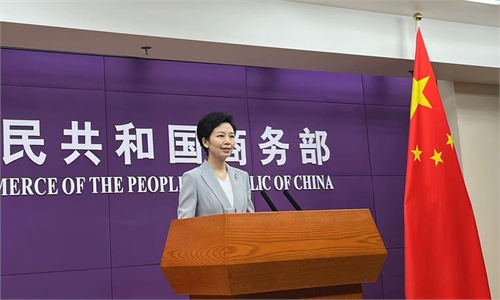China to impose 5-year anti-dumping duties on brandy imports from EU starting July 5: MOFCOM

The Ministry of Commerce of China File photo: VCG
China's Ministry of Commerce (MOFCOM) on Friday issued its final ruling after an anti-dumping investigation into brandy imports from the EU, concluded that there is clear evidence of dumping. The domestic brandy industry is under substantial threat of damage, and there is a causal relationship between the dumping and the threat of damage, the ministry said.
The final dumping margin has been determined at 27.7 to 34.9 percent. The anti-dumping duties and implementation of the accepted price undertakings will be effective for five years starting from July 5, 2025, according to MOFCOM.
MOFCOM also announced that, following a lawful review, it has accepted price undertakings submitted by relevant EU industry associations and companies. Imports that meet the terms of the undertakings will be exempt from anti-dumping duties.
The decision was driven by two main considerations, said Cui Hongjian, director of the Department of European Studies, China Institute of International Studies. First, to maintain domestic market order; and second, to protect the legitimate rights and interests of Chinese enterprises.
In recent years, China has increasingly incorporated internationally accepted rules, including those of the WTO, into its domestic policies and legal framework - demonstrating both its respect for international norms and its steady progress in advancing the rule of law at home, Cui told the Global Times on Friday.
A spokesperson for MOFCOM said on Friday that the ministry had conducted the investigation in strict accordance with Chinese laws and regulations, ensuring the rights of all interested parties and soliciting broad input. Based on verified facts and evidence, the investigation concluded that the imported brandy from the EU involves dumping, with a margin ranging from 27.7 to 34.9 percent.
The anti-dumping investigation was launched on January 5, 2024, following a request from the domestic industry.
The spokesperson noted that following the preliminary ruling, relevant EU industry associations and companies voluntarily submitted price undertaking applications within the required timeframe. After careful review, the investigating authority accepted undertakings that complied with Chinese legal requirements.
Exporters meeting the terms of the accepted undertakings will be exempt from anti-dumping duties, according to the spokesperson.
"On the one hand, the decision was based on China's own market conditions and its understanding of relevant rules; on the other hand, it kept open a channel for resolving the issue with the EU," Cui said. He highlighted that this approach serves as a demonstration to the European side, showing that while differences may exist, what matters most is that both sides find practical and workable solutions.
It also sends another signal that the EU can hopefully draw lessons from China's approach, Cui said.
China has consistently advocated for the prudent use of trade remedies, and its acceptance of price undertakings in this case reflects a commitment to resolving trade frictions through dialogue and consultation, the spokesperson said.
The spokesperson expressed hope that the EU will meet China halfway to enhance communication, jointly address trade disputes, and create favorable conditions for consolidating and expanding China-EU economic and trade cooperation.
Following "focused, candid, and in-depth" discussions between Chinese commerce officials and EU trade chiefs in early June in Paris on urgent and important issues, including the EU's anti-subsidy probe into Chinese electric vehicles (EVs), China's anti-dumping probe into EU brandy, and export controls, MOFCOM said in a statement on June 7 that the EV price commitment negotiations between China and the EU had entered the final stage, while Chinese authorities were reviewing the EU brandy price commitment text and were scheduled to make a final ruling before July 5.
At the 13th round of the China-EU High-level Strategic Dialogue held on Wednesday (local time) at the EU headquarters in Brussels, Chinese Foreign Minister Wang Yi, also a member of the Political Bureau of the Communist Party of China Central Committee, called on Europe to adopt a truly objective and rational understanding of China and follow a more positive and pragmatic policy.
Cui noted that negotiations between China and the EU are still ongoing, and both sides need to step up their efforts. The release of the brandy investigation findings also serves as a reminder to the EU that trade frictions between the two sides are best addressed through dialogue and consultation, rather than through escalation or tit-for-tat measures.


